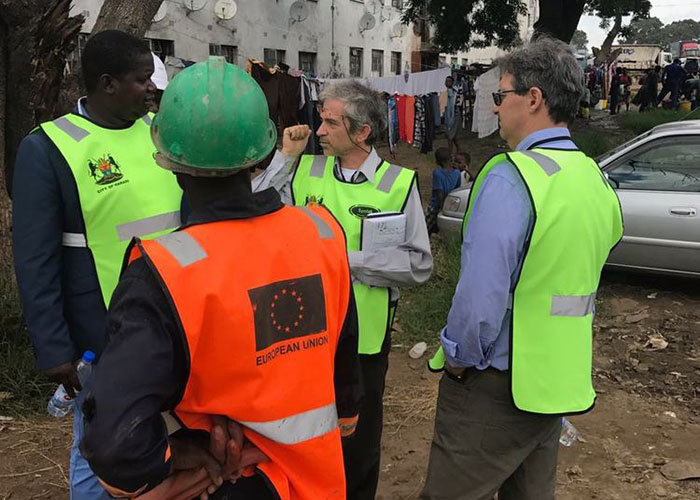
The Sunday Mail

Emmanuel Kafe
For long, Harare’s oldest suburb — Mbare — has been a dark allure, a gateway into and out of Harare and a classic melting pot.
The place has earned itself immense popularity such that people say you cannot claim to have been to Harare if you have not visited Mbare.
Bus loaders, touts, cart pushers, travellers and vendors selling different wares are permanent features as they traverse the bus termini daily, sometimes late into the night, trying to eke a living.
But gone are the days when the place was envied for its cleanliness.
Mbare is home to the capital’s biggest market place, Mbare Musika, were all sorts of saleable things are found. The place attracts farmers from all over the country as they sell their produce.
It is a hub of all sorts of business activities, and with a lot of people trading at the place, the area has become filthy with uncollected garbage strewn everywhere.
Farmers and vendors who sell their agricultural produce at the market place are contributing to the heaps of waste at the market place.
Burst sewer pipes, rotten food stuffs and garbage all add to the foul smell that engulfs the market area.
This has been contributing to the outbreak of diseases such as cholera, typhoid and malaria.
To address this anomaly, the Harare City Council embarked on a waste management project which is being jointly funded by the European Union.
It is a bio-digester initiative that will see all decomposable materials channelled to the plant.
The main feeder of this project is Mbare Musika, which according to city council studies, generates about five tonnes of litter per day, meaning that in a month it generates about 150 tonnes, which is a lot of waste.
The end product of the project will be biogas, a mixture of different gases produced by breaking organic matter in the absence of oxygen. It can be produced from agricultural waste, manure, municipal waste, sewer, green waste or food waste.
It is a renewable source of energy which leaves an insignificant carbon footprint.
The project, located in the Matapi-Shawasha areas of Mbare, is projected to cost $500 000 and is almost 90 percent complete. After completion of the project, Mbare residents will be receiving electricity generated from the bio-digesters.
Harare City Council town clerk, Mrs Josephine Ncube, said the digesters will produce 100kVA of power.
“On commission, the bio-digester will produce 1 000kVA of power. However, there is provision for the expansion of the plant to increase its power generation capacity,” she said.
The digesters will provide a non-polluting and renewable source of energy to Mbare for lighting and other uses. The other added advantage will be the reduction of costs of disposing of agricultural waste from the market, which is presently being taken to Pomona.
To give the community a sense of ownership of the project, some community members will be engaged in taking the waste to the plant for a fee.
“Down the value chain, waste separators consisting of market stall owners, vendors and the Mbare community shall benefit from payments made for the separated waste deposited at the plant,” said Mrs Ncube.
Heated showers will also be installed for the community. These will be used by the public for a fee.
A snap survey conducted by The Sunday Mail Extra revealed that most residents have welcomed the bio-digester initiative, noting that it will provide them with an improved supply of electricity.
“This will save us buying electricity, wood and paraffin. This is an efficient way of energy conversation,” said Batsirai, a Matapi resident.
The project, according to energy experts, will not only provide energy to the residents but has other benefits in areas of health, agriculture, education and even in social policy-making.
Energy expert, Mr Fidelis Mangoma, said biogas technology does not only support national economies and help with the conservation of the environment, but provides for a wide range of improvements in overall living conditions.
 A delegation from the Harare City Council and European Union checks progress on the bio-digester project in Mbare
A delegation from the Harare City Council and European Union checks progress on the bio-digester project in MbareHealth-wise, sanitary and health conditions improve and even the quality of nutrition is enhanced by an improved energy availability.
By collecting garbage, open disposal of waste is avoided.
Apart from this, pathogens are extensively eliminated during the digestion process.
Amai Shupikai of Matapi said biogas lighting makes it possible to engage in activities such as reading or attending evening courses.
Environmental Management Agency spokesman, Mr Steady Kangata, said biogas energy and bio-digesters have no negative impact on the environment.
He added that the project is environmentally friendly as the biogas plant significantly lowers the greenhouse effect on the earth’s atmosphere, as well as using methane emissions, trapping the harmful gas and converting it to fuel.
“It captures and uses methane, a greenhouse gas which is worse than carbon dioxide. It also converts high energy waste streams into fuel,” he said.
The Rural Electrification Agency (REA) has already constructed plants at Harare Hospital and Roosevelt High School.
Bio-digesters are increasingly getting popular around the world.
Nigeria’s African Woman and Rural Environment (AWARE) has established digesters in different communities, benefiting the environment as well as the economic well-being of over 500 rural women.
India also has the Mumbai Women Bio-digester Project.
According to a United Nations report of 2015, ‘Valuing Human Waste As An Energy Resource’, gas produced by decaying human waste and other decomposable materials is potentially a major source of energy that provide electricity for millions of homes while improving sanitary conditions in developing countries.



